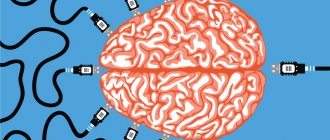Communication is necessary not only for the transfer of experience, but also for establishing new social contacts, resolving conflicts and many other things, without which modern man would not be able to call himself civilized. Even the progress of modern science would be impossible without speech and the ability to store information in the form of writing, which was created on the basis of verbal communication.
Articles on the topic
- What to do if a work colleague is annoying: how to avoid confrontation 12/06/2020
- How to ignore someone who annoys you and stay calm 12/06/2020
- Primitive communication: how not to succumb to the pressure of a boor 11/14/2020
- An important step to success in life is effective communication 11/14/2020
The role of communication in human life: philosophy and psychology
Philosophy views the process of communication as a way through which the internal evolution of society and small groups occurs. This is accomplished through the dialectical interaction of the individual with society.
In psychology, the approach is somewhat different. Here, communication is considered as a process of interaction that is necessary in order to realize other types of human activities.
Communication is one of the main factors in the self-formation of personality, which is confirmed by the findings of psychologists.
Communication means
Everything a person does while in the process of communication has some communication meaning. Words, intonation, speed of speech, posture, gait, posture, gestures, facial expressions and much more merge together and are perceived by people as something indivisible. However, psychology distinguishes between verbal and nonverbal means of communication, because their influence on people’s perception of information varies.
Verbal means of communication include human speech itself, the words used, types of grammatical structures, speech style, and literary techniques. As a rule, verbal means are more straightforward.
The group of nonverbal communication means is much more diverse and interesting. It consists of the following components:
- Facial expressions.
- Gestures.
- Pantomime.
- Poses.
- Posture.
- Body position in space.
- Visual contact.
- Extralinguistic factors (voice timbre, speech rate, intonation, pauses).
Why is communication necessary?
A person needs to communicate. This is his natural need, conditioned by his constant presence in a social unit, such as a family, a work collective, or a school or student class.
In a person’s life, the role of communication is incredibly significant, as it occupies one of the main positions influencing the psyche. A person deprived of the opportunity to communicate with his own kind will never be able to become a social person. He will not have enough civilization and culture, only a human appearance. Here, an example would be “Mowgli people”, in whom the body develops as usual, but mental development is greatly delayed due to the lack of contact with other people.
And although communication seems natural for most people, some may still experience various problems: fear, social phobia. Usually the cause of the problem is hidden in adolescence, when the first conscious entry into society occurs. If it fails, the result may be difficulty finding contact with other people.
Is it worth talking about?
Restraint and the ability to solve problems independently, “not whine” and “not burden” others are perceived by many people as an exceptional virtue. I feel bad, but I smile, talk about the sun and flowers: aren’t I great? Don’t I protect my loved ones from negativity?
The answer is not entirely clear-cut. If we are talking about really close people, and not about tired colleagues during a deadline. The fact is that relatives and lovers often really feel us, our condition, mood, resentment or sadness. But not finding confirmation for them, they begin to worry. You about And the interlocutor feels anxiety: something is wrong. Maybe he doesn't deserve your trust? Or did he offend you without noticing it?
Some people simply do not need to share their experiences - due to internal characteristics. There may not be any childhood trauma or sad experience behind this. It’s just that one person needs a large support group, another needs a conversation with a friend, and a third just needs to be left alone, not touched, and allowed to figure it out on his own.
What characterizes communication?
To begin with, it is worth highlighting the content of communication. It could be:
- transfer of knowledge or experience;
- perception of the interlocutor;
- mutual assessment of each other by interlocutors;
- mutual influence;
- interaction;
- action management.
These are the main points that explain the role of communication in human life.
Now it’s worth moving on to the functions of communication that are recognized in world science:
- Instrumental. Dialogue is required in order to take a certain action, and it is also necessary to manage and transmit information.
- Syndicate. Dialogue is a means of unification.
- Self-expression. Dialogue is used for mutual understanding.
- Broadcasting. Dialogue is necessary to convey certain ways of doing things or evaluating things.
Secondary functions are also highlighted:
- expressive - emotional states and experiences are mutually understood by the interlocutors;
- social control - determining the algorithm of behavior and actions;
- socialization - instilling skills in interacting with society according to generally accepted rules.
If one of the previously mentioned functions is broken or completely absent, then establishing contact will be very difficult.
Forms of communication
The task of communication and communication in its narrow sense is to establish interaction and further joint activities. People realize their communication needs in both written and oral forms. Traditional forms of oral communication include conversation, public speaking, presentation, negotiations, meeting, business conversation.
Written forms of communication include correspondence, essays, letters, including electronic ones, reports, documentation, essays and many other varieties. Each of the above forms of communication has its own characteristics and features, which allow us to determine in which cases it is better to use one or another communication form.
Difference in communication structure
There is a certain structure of communication, usually the following sides of the dialogue are distinguished:
- Communicative. This is the exchange of information between interlocutors.
- Interactive. Sharing both knowledge and actions.
- Perceptual. The process of perceiving each other during a conversation. Assessment of appearance, character and other traits.
The main means of communication remains language, but dialogue can also involve gestures, various signs and other ways to convey your thoughts to the interlocutor.
What do we receive from others?
Of course, we can already understand why a person needs communication. However, this cannot always be explained. People need communication not only as a necessity. There are other positive aspects as well. For example, we can acquire many skills and abilities with the help of others.
People exchange information, experience, knowledge - and all this is called communication. The main thing is to correctly build a dialogue with your interlocutor. When people exchange experiences or information, they gain deeper insight, become smarter, more conscious, and more cultured.
Very often, interesting ideas and thoughts come only when there is a dialogue between people. Any practical advice often helps a person. Psychologists know exactly why a person needs communication. They argue that there is no full-fledged personality without dialogue. That is, in order for a person to be able to correctly express his thoughts, he needs to communicate as often as possible.
The benefits of live communication with people
Man is a social being. People constantly interact with each other. Communication often occurs through conversation. What is communication and how important is it for every person?
Terms of communication
Interaction between individuals is carried out taking into account certain conditions. Cultural and social foundations play a major role. Much also depends on who the interlocutor is.
For example, in one area, colleagues may greet each other with a smile or a nod (non-verbal communication). In another, a handshake is required.
It is customary to address elders by “Va”, and to managers by their first name and patronymic. Communication with loved ones and friends can be more open and emotional than with a stranger.
Communication structure
Communication has a so-called structure:
- Content. Transfer of information (knowledge, experience, skills) from one person to another.
- Target. The need that determined the beginning of contact. Needs can be cultural, moral, creative, social.
- Methods of transmitting information. There are communicative methods - conversation, interactive - joint activities and perceptual - mutual perception.
As you can see, people know how to interact with society in different ways. Various technical methods of communication are used.
Stages of communication
Surprisingly, communication occurs in a certain sequence. Here are the main stages of communication:
- Visual contact. The ability of an individual to perceive someone like himself in the objective world.
- Greetings. A sign of approval and friendliness. People greet each other with gestures or words.
- Exchange of conventions, that is, formal information. You can ask about the affairs and health of your interlocutor. If people have common, deeper topics for conversation, then the conversation will continue. If not, it will end with a gracious farewell.
Basic functions of communication
Creative communication simultaneously performs several important functions, namely:
- Self-knowledge. By interacting with others, a person gets to know himself more and better.
- Self-validation. Communication helps you feel like a complete person.
- Exchange of emotions.
- Coordination of events and achievement of agreement in joint activities.
- Transmission and acceptance of up-to-date information.
- Influence on the opponent. Obtaining a certain benefit.
- Meeting new people and finding your place in society.
Communication allows people to move forward. Helps you develop and not stop there.










